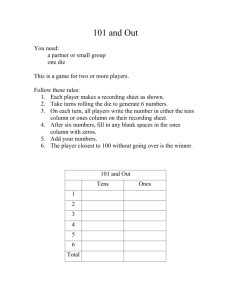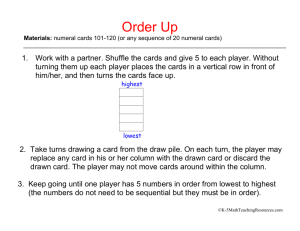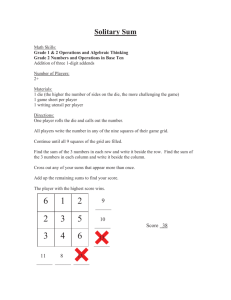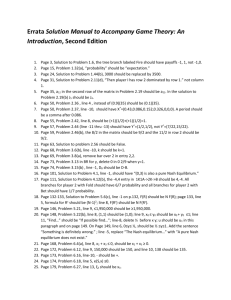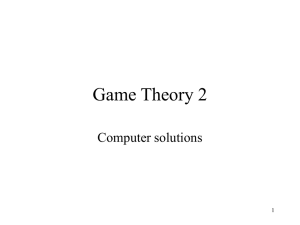Unit 3 - Business Management Courses
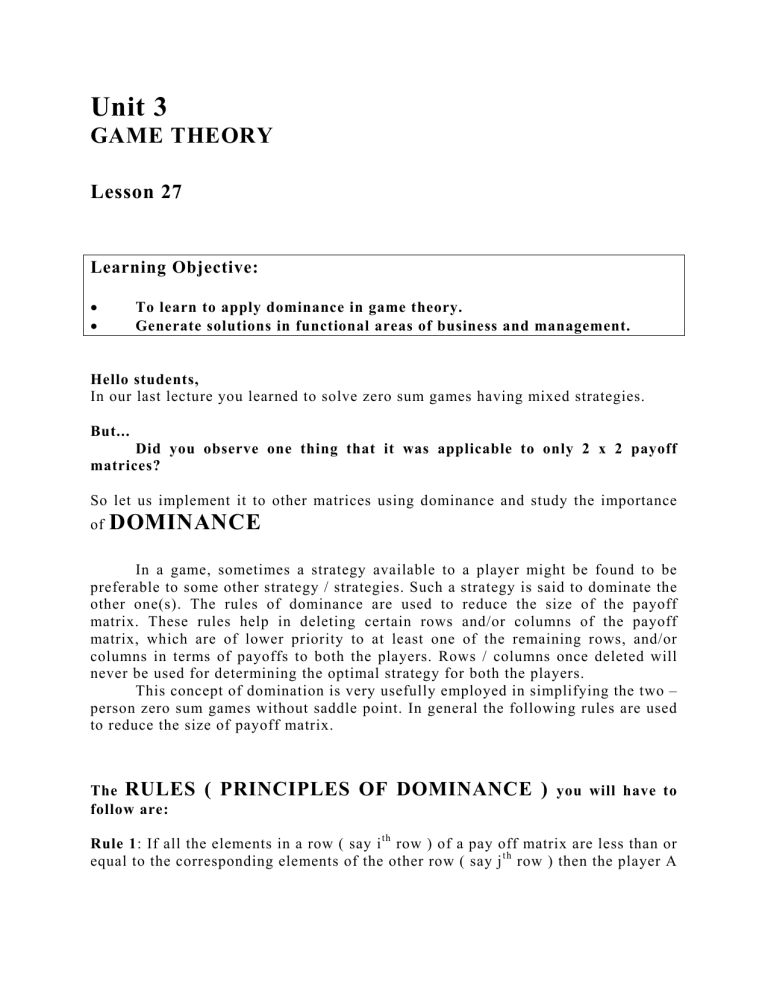
Unit 3
GAME THEORY
Lesson 27
Learning Objective:
•
•
To learn to apply dominance in game theory.
Generate solutions in functional areas of business and management.
Hello students,
In our last lecture you learned to solve zero sum games having mixed strategies.
But...
Did you observe one thing that it was applicable to only 2 x 2 payoff matrices?
So let us implement it to other matrices using dominance and study the importance of
DOMINANCE
In a game, sometimes a strategy available to a player might be found to be preferable to some other strategy / strategies. Such a strategy is said to dominate the other one(s). The rules of dominance are used to reduce the size of the payoff matrix. These rules help in deleting certain rows and/or columns of the payoff matrix, which are of lower priority to at least one of the remaining rows, and/or columns in terms of payoffs to both the players. Rows / columns once deleted will never be used for determining the optimal strategy for both the players.
This concept of domination is very usefully employed in simplifying the two – person zero sum games without saddle point. In general the following rules are used to reduce the size of payoff matrix.
The
RULES ( PRINCIPLES OF DOMINANCE )
you will have to follow are:
Rule 1 : If all the elements in a row ( say i th row ) of a pay off matrix are less than or equal to the corresponding elements of the other row ( say j th row ) then the player A
will never choose the i and will delete the i th th strategy then we say i
row. th strategy is dominated by j th strategy
Rule 2 the r th
: If all the elements in a column ( say r
strategy is dominated by the s th th column ) of a payoff matrix are greater than or equal to the corresponding elements of the other column ( say s column ) then the player B will never choose the r th th column . th
strategy or in the other words
strategy and we delete r
Rule 3 : A pure strategy may be dominated if it is inferior to average of two or more other pure strategies.
Now, consider some simple examples
Example 1
Given the payoff matrix for player A, obtain the optimum strategies for both the players and determine the value of the game.
Player B
6 -3 7 Player A
-3 0 4
Solution
Player A A1
A2
B1
6
Player B
B2
-3
B3
7
-3 0 4
When A chooses strategy A1 or A2, B will never go to strategy B3. Hence strategy
B3 is redundant.
Player A
A1
A2
Player B
B1 B2
6
-3
-3
0
Row minima
-3
-3
6 0
Minimax (=0), maximin (= -3).Hence this is not a pure strategy with a saddle point.
Let the probability of mixed strategy of A for choosing Al and A2 strategies are p
1
and 1 p
1 respectively. We get
6
p
1
- 3 (1 -
p
1
) = -3
p
1
+ 0 (1 -
p
1
) or
p
1
=1/ 4
Again,
q
1
and 1 -
q
1
being probabilities of strategy B, we get
6 q
1
- 3 (1 - q
1
) = -3 q
1
+ 0 (1 - q
1
) or q
1
=
1/ 4
Hence optimum strategies for players A and B will be as follows:
S
A
=
A1 A2
3/4 and
B1 B2 B3
S
B
=
1/4 3/4 0
Expected value of the game = q
1
(6 p
1
-3(1 p
1
)) + (1- q
1
)(3 q
1
+ 0(1- q
1
)) = ¾
Example 2
In an election campaign, the strategies adopted by the ruling and opposition party alongwith pay-offs (ruling party's % share in votes polled) are given below:
Opposition Party's Strategies
Ruling Party's Strategies
Campaign one day in each city
Campaign two days in large towns
Spend two days in large.
rural sectors
Campaign one day in each city
Campaign two days in large towns
55
70
40
70
35
55
Spend two days in large rural sectors 75 55 65
Assume a zero sum game. Find optimum strategies for both parties and expected payoff to ruling party.
Solution. Let A1, A2 and A3 be the strategies of the ruling party and B1, B2 and
B3 be those of the opposition. Then
Player B
A1
B1
55
B2
40
B3
35 Player A
Here, one party knows his strategy as well as other party's strategy and one person's gain is another person's loss.
Now, with the given matrix:
Player A A1
B1
Player B
B2
55 40
B3
35
Row minima
35
As maximin = 55 and minimax = 65 , there is no saddle point.
Row 1 is dominated by row 2 and column 1 is dominated by column 2 giving the
reduced 2 x 2 matrix as
:
B2 B3
A2 70 55
For ruling party: Let the ruling party select strategy A2 with a probability of p
1 therefore opposition party selects strategy A3 with a probability of (1 – p
1
and
) Suppose the opposition selects strategy B2. Then the expected gain to ruling party for this game is given by :
70 p
1
+ 55 (1 - p
1
) = 15 p
1
+ 55
On the other hand, if opposition party selects strategy B3, then ruling party's expected gain is :
55 p
1
+ 65 (1- p
1
) = -10 p
1
+ 65
Now, in order for ruling party to be indifferent to which strategy, opposition party selects, the optimum plan for ruling party requires that its expected gain should be equal for each of opposition party's possible strategies. Thus equating two equations of expected gain, we get
15 p
1
+ 55 = -10Pl + 65 or p
1
= 2/5 and 1 - p
1
= 3/5
Hence ruling party would select strategy A2 with probability of 0.4 and
strategy A3 with probability of 0.6.
For opposition party. Let opposition party select strategy B2 and B3 with a probability of q l
and (1 – q
1
) respectively. The expected loss to opposition party when ruling party adopts strategy A2 and A3 respectively is :
1
) = 15ql + 55 and 55 q
1
+ 65 (1 - q
By equating expected losses of opposition party, regardless of what ruling party would choose, we get l
) = -10ql + 65
15
1
= 2/5 and (1 – q
1
) = 3/5
Hence opposition party would choose strategy B2 and B3 with a probability of
0.4 and 0.6 respectively.
The value of the game is determined by substituting the value of p
1 of the expected values and is determined as 61, i. e.,
and q
1
in any
Expected gain to ruling party:
(i) 15 x 0.4 + 55 = 61
(ii)-10 x 0.4 + 65 = 61
Expected loss to opposition party:
(i) 15 x 0.4 + 55 = 61
(ii) -10 x 0.4 + 65 = 61
Example 3
Even though there are several manufacturers of scooters, two firms with branch names Janta and Praja, control their market in Western India. If both manufacturers make model changes of the same type for this market segment in the same year, their respective market shares remain constant. Likewise, if neither makes model changes, then also their market shares remain constant. The pay-off matrix in terms of increased/decreased percentage market share under different possible conditions is given below:
Praja
Janta
No change
No change
0
Minor change
-4
Major change
-10
to itself?
(i) Find the value of the game.
(ii) What change should Janta consider if this information is available only
.
Solution.
(i) Clearly, the game has no saddle point. Making use of dominance principle, since the first row is dominated by the third row, we delete the first row. Similarly, first column is dominated by the second column and hence we delete the first column. The reduced pay-off matrix will be as follows:
Praja
Minor change Major change
Janta
Minor change 0 5
Major change 1 0
As the reduced pay-off matrix does not possess any saddle point, the players will use mixed strategies. The optimum mixed strategy for player A is determined by
: p
1
a
22
– a
21
-------------------
11
+a
22
– (a
12
+ a
21
) p
2
= 1-p
1 = q
1 22
– a
12
-------------------
a
11
+a
22
– (a
12
+ a
21
) q
2
=
The expected value of the game is given by
=
= 0-1
---------- --
0+0-(5+1) 6
5/6
= 0-5
= 1
= 5
---------- --
0+0-(5+1) 6
1/6
V = a
11 a
22
– a
21 a
12
-----------------------
a
11
+a
22
– (a
12
+ a
21
)
Hence the optimal mixed strategies are
S =
A
1
A
2
A
3
A
5/6
S
B
=
B
1
B
2
B
3
1/6
= (0x0)-(1x5) = 5/6
------------------
0+0-(5+1)
(ii) Janta may consider to have minor change with probability 5/6 and of major change with probability 1/6 .
Now,
Apply this method on some Unsolved Problems yourself
Q.1. Indicate the value of the game.
8 4 10
10
9 7 5 4
Q.2. For the following ‘two-person, zero-sum’ game, find the optimal strategies for the two players and value of the game:
Player B
B1 B2 B3
A1 9 9 3
A3
Determine it using the principle of dominance.
Q.3. Assume that two firms are competing for market share for a particular product.
Each firm is considering what promotional strategy to employ for the coming period. Assume that the following payoff matrix describes the increase in market share of Firm A and the decrease in market share for Firm B.
Determine the optimal strategies for each firm.
Firm B
Firm A
Non Promotion
Non Promotion
5
Moderate Promotion Much Promotion
0 -10
(i) Which firm would be the winner, in terms of market share?
(ii) Would the solution strategies necessarily maximize profits for either of the firms?
(iii) What might the two firms do to maximize their profits?
So, now let us summarize today’s discussion:
Summary
We have discussed about:
• Importance of Dominance.
• Rules for Dominance.
• Applications of Dominance.
Slide 1
GAME THEORY
LESSON 3
______________________________________________________________________________
______________________________________________________________________________
______________________________________________________________________________
______________________________________________________________________________
______________________________________________________________________________
______________________________________________________________________________
______________________________________________________________________________
______________________________________________________________________________
______________________________________________________________________________
______________________________________________________________________________
______________________________________________________________________________
Slide 2
DOMINANCE
What is a Dominant Strategy?
A particular strategy that is found to be preferable over other strategies available to a player is called the “dominant strategy” for that player.
______________________________________________________________________________
______________________________________________________________________________
______________________________________________________________________________
______________________________________________________________________________
______________________________________________________________________________
______________________________________________________________________________
______________________________________________________________________________
______________________________________________________________________________
______________________________________________________________________________
______________________________________________________________________________
______________________________________________________________________________
Slide 3
PRINCIPLES OF DOMINANCE
RULE 1 z If all the elements in a row ( say i th row ) of a pay off matrix are less than or equal to the corresponding elements of the other row ( say j th row ) then the player A will never choose the i th strategy then we say i th strategy is dominated by j th strategy and will delete the i th row.
______________________________________________________________________________
______________________________________________________________________________
______________________________________________________________________________
______________________________________________________________________________
______________________________________________________________________________
______________________________________________________________________________
______________________________________________________________________________
______________________________________________________________________________
______________________________________________________________________________
______________________________________________________________________________
______________________________________________________________________________
Slide 4
PRINCIPLES OF DOMINANCE
RULE 2 z If all the elements in a column ( say r th column ) of a payoff matrix are greater than or equal to the corresponding elements of the other column ( say s th column ) then the player B will never choose the r th strategy or in the other words the r th strategy is dominated by the s th strategy and we delete r th column .
______________________________________________________________________________
______________________________________________________________________________
______________________________________________________________________________
______________________________________________________________________________
______________________________________________________________________________
______________________________________________________________________________
______________________________________________________________________________
______________________________________________________________________________
______________________________________________________________________________
______________________________________________________________________________
______________________________________________________________________________
Slide 5
PRINCIPLES OF DOMINANCE
RULE 3 z A pure strategy may be dominated if it is inferior to average of two or more other pure strategies.
______________________________________________________________________________
______________________________________________________________________________
______________________________________________________________________________
______________________________________________________________________________
______________________________________________________________________________
______________________________________________________________________________
______________________________________________________________________________
______________________________________________________________________________
______________________________________________________________________________
______________________________________________________________________________
______________________________________________________________________________
